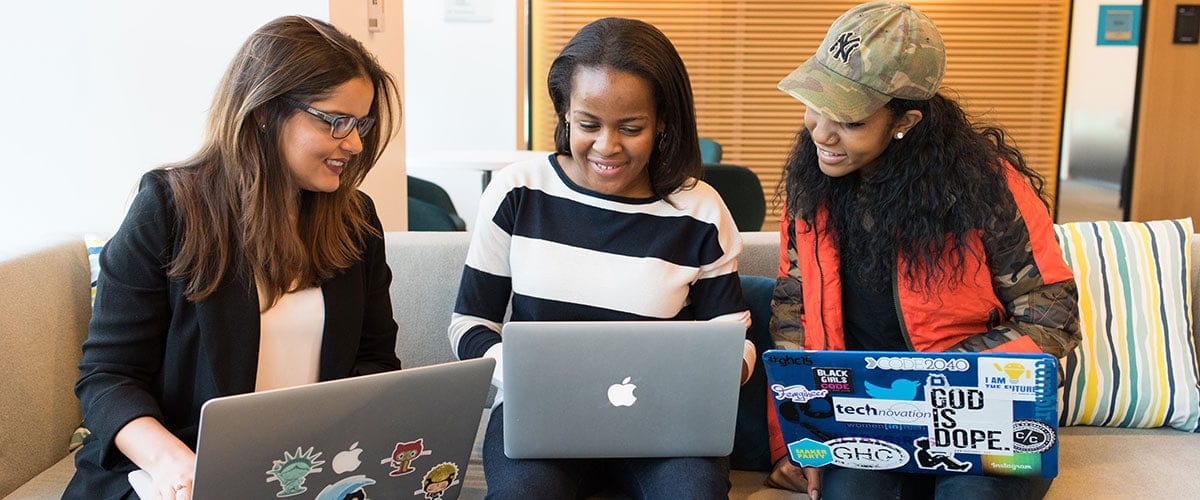

The role of diversity in a workplace mentoring programme
Often in both our home and work lives we can become stuck in a rut, simply spinning our wheels and making no forward progress. In work (and perhaps outside too) one sure-fire way to help get moving again is with the assistance of a workplace mentor. But what about the role of diversity in mentorship?
Updated 19th November 2023
Mentorships are great, both for employees and the business. Mentors offer judgement-free advice, listening with an open mind that helps us steer clear of mistakes they have themselves had close run-ins with. When mentorships go well, they lead to growth for both individuals and better performance for an organisation.
But, for everyone to get the absolute most out of mentorships, we need someone who can offer us a new perspective, a fresh way of thinking and a unique world view. So, today, we'll be exploring the role of diversity in mentorships, and why you don't just want to pair people up with carbon copies of themselves.
Mentoring and education can make all the difference in the world
Workplace education is vital, not just for teaching important skills, but for helping employees to invest in their role and become fully engaged. It also plays an important role for those doing the educating, with benefits for their own engagement, learning and job satisfaction.
Mentorship policies are one of the most effective forms of workplace education because both the mentor and mentee can benefit hugely.
Martin George, the Customer Director at Waitrose, recently spoke about building a successful marketing career, and extolled the virtues of mentorship:
'Identify people around you who you can learn from, who can sponsor you, mentor you and coach you. It really, really matters. And they're not just people senior to you, or even necessarily in your function, but people who have a capability, or a skill, or an experience that you can learn from.'
Martin George - Customer Director, Waitrose
The role of diversity in mentorships
You ignore the role of diversity in mentorships (and workplace culture in general) at your peril. Diversity can give help to give businesses the edge over their competitors.
Teams with a wider range of experiences can innovate more effectively through collaboration and design products and services fit for more customers.
Diversity mentorship programs can also help make certain careers accessible to a much wider range of people. This is essential for facilitating organisational change on a grand scale.
Mentors who know what their mentees are going through are great...
There can be great reasons why you might pair employees to mentors based on what they have in common. Demographic does influence employee experience, and it can be useful to talk to someone who's been around that same particular block. Part of the role of diversity in mentorships is to make career paths more widely accessible.
A female, LGBTQ or BAME employee might be paired with a corresponding mentor because they can help navigate and overcome specific kinds of discrimination in a way that someone without that lived experience could not. This can do a lot to support the wellbeing of a diverse team of employees, but it shouldn't be the only important factor..
...But if they have everything in common, there's only so much to learn
It can be tempting for mentors to pick out a younger version of themselves and make them their protégé. But that approach is more limiting than it seems. If someone is already well on-track to becoming like you, there's only so much that you'll be able to teach them and vice versa.
The role of diversity in mentorships is to introduce mentees to insights that they wouldn't necessarily have discovered by themselves. Pairing people who have radically different experiences can often create the most opportunities for learning.
You might generally think of mentorship as an "I teach, you listen" sort of relationship. But that's not really true. Teachers learning from their students is something that happens in real life, and not just in heartwarming movie plots. But mentors are much less likely to learn anything of value from their younger self and research shows they are less likely to be open to learning.
The role of diversity in mentorship broadens employee horizons
We generally look to the youngest generations entering the workforce for innovation and new life. Case in point, Gen Z has arguably done a lot to push feedback culture in the last few years. Pairing them with older mentors enables them to share that innovative mentality while getting the benefit of their mentor's decades of experience.
So, the role of diversity in mentorships can be to open employees up to new perspectives. Even pairing people from entirely separate departments or professions can be a great way of broadening skillsets. As Martin George put it:
'When I first joined BA, they had created a brand-new brand management function. And it consisted of people with airline experience and no marketing experience, and some who had marketing experience, but no airline experience [...] I worked for someone who had the sort of opposite, the Ying to my Yang. And that was a really, really smart way of creating that department.'
Make the most of valuable skills with reverse mentoring
In that podcast interview, Martin George highlighted an idea that's incredibly useful for diversity and inclusion mentoring: reverse mentorship.
'You know [...] Waitrose have just started a program of reverse mentoring, and they're finding it incredibly powerful. And we've done it in previous organisations that I've worked for, and you can learn so much from having colleagues, partners, mentors around the organisation. And, you know, I strongly recommend that. It doesn't just have to be somebody senior to you. It can be somebody at any level in the organisation.'
Martin George - Customer Director, Waitrose
Essentially then, reverse mentorship does away with the idea that the mentor should be someone with seniority. Any employee could, in theory, have incredibly valuable skills to share with others in the business. After all, even the CEO of a business might need some help getting to grips with the latest tech solutions.
This feeds back into the role of diversity in mentoring. Even people with widely differing levels of seniority can learn from each other. So, if the people with highly sought-after skills in your organisation are still a bit wet behind the ears, don't worry. You don't need to wait for them to make it to manager before you ask them to teach others.
In fact, that experience might be the thing that shows them they love mentoring, or even managing. These are the kinds of realisations you enable by embracing the role of diversity in mentorships.




